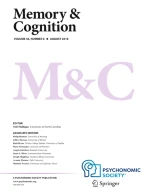Abstract
Two empirical challenges to the traditional “modal model” of short-term memory are that neither the Brown-Peterson distractor technique nor the recency effect in recall is well accommodated by that position. Additionally, the status of memory stores as such, has declined in response to proceduralist thinking. At the same time, the concept of coding, on which the modal model is silent, is increasingly central to memory theory. People need to remember things in the short term, but a dedicated store does not need to be the agency.
Article PDF
Similar content being viewed by others
Avoid common mistakes on your manuscript.
References
Atkinson, R. C., &Shiffrin, R. M. (1968). Human memory: A proposed system and its control processes. In K. W. Spence & J. T. Spence (Eds.),The psychology of learning and memory (Vol. 2, pp. 89–195). New York: Academic Press.
Baddeley, A. D. (1966). The influence of acoustic and semantic similarity on long-term memory for word sequences.Quarterly Journal of Experimental Psychology,18, 302–309.
Baddeley, A. D., &Hitch, G. J. (1977). Recency reexamined. In S. Dornic (Ed.),Attention and performance (Vol. 6, pp. 647–667). Hillsdale, NJ: Erlbaum.
Bjork, R. A., &Whitten, W. B. (1974). Recency-sensitive retrieval processes in long-term free recall.Cognitive Psychology,6, 173–189.
Brooks, J. O., III., &Watkins, M. J. (1990). Further evidence of the intricacy of memory span.Journal of Experimental Psychology: Learning, Memory, & Cognition,16, 1134–1141.
Cowan, N. (1988). Evolving conceptions of memory storage, selective attention, and their mutual constraints within the human information-processing system.Psychological Bulletin,104, 163–191.
Craik, F. I. M., &Lockhart, R. S. (1972). Levels of processing: A framework for memory research.Journal of Verbal Learning & Verbal Behavior,11, 671–684.
Crowder, R. G., &Neath, I. (1991). The microscope metaphor in human memory. In W. E. Hockley & S. Lewandowsky (Eds.),Relating theory and data: Essays on human memory in honour of Bennet B. Burdock, Jr. (pp. 111–125). Hillsdale, NJ: Erlbaum.
Glenberg, A. M., &Swanson, N. C. (1986). A temporal distinctiveness theory of recency and modality effects.Journal of Experimental Psychology: Learning, Memory, & Cognition,12, 3–24.
Greene, R. L. (1986). Acommon basis for recency effects in immediate and delayed recall.Journal of Experimental Psychology: Learning, Memory, & Cognition,12, 413–418.
Hebb, D. O. (1949).Organization of behavior. New York: Wiley.
Hebb, D. O. (1961). Distinctive features of learning in the higher animal. In I. F. Delafresnaye (Ed.),Brain mechanisms and learning. New York: Oxford University Press.
James, W. (1983).The principles of psychology. Cambridge: Harvard University Press (Original work published 1890)
Johnson, G. J. (1991). Adistinctiveness model of serial learning.Psychological Review,98, 204–217.
Keppel, G., &Underwood, B. J. (1962). Proactive inhibition in shortterm retention of single items.Journal of Verbal Learning & Verbal Behavior,1, 153–161.
Kolers, P. A., &Roediger, H. L., III. (1984). Procedures of mind.Journal of Verbal Learning & Verbal Behavior,23, 425–449.
Koppenaal, L., &Glanzer, M. (1990). An examination of the continuous distractor task and the “long-term recency effect”.Memory & Cognition,18, 183–195.
Martin, R. C. (1993). Short-term memory and sentence processing: Evidence from neuropsychology.Memory & Cognition,21, 176–183.
Miller, R. R., &Marlin, N. A. (1984). The physiology and semantics of consolidation. In H. Weingartner & E. S. Parkers (Eds.),Memory consolidation: Psychobiology of cognition (pp. 85–110). Hillsdale, NJ: Erlbaum.
Murdock, B. B., Jr. (1960). The distinctiveness of stimuli.Psychological Review,67, 16–31.
Nairne, J. S. (1991). Positional uncertainty in long-term memory.Memory & Cognition,19, 332–340.
Neath, I. (1991).Context and distinctiveness in memory: Evidence for a two-stage process of retrieval. Unpublished doctoral dissertation, Yale University, New Haven, Connecticut.
Peterson, L. R., &Peterson, M. J. (1959). Short-term retention of individual items.Journal of Experimental Psychology,61, 12–21.
Potter, M. C., &Lombardi, L. (l990). Regeneration in the short-term recall of sentences.Journal of Memory & Language,29, 633–654.
Roediger, H. L., III. (1980). Memory metaphors in cognitive psychology.Memory & Cognition,8, 231–246.
Roediger, H. L., III, &Crowder, R. G. (1976). A serial position effect in recall of United States presidents.Bulletin of the Psychonomic Society,8, 275–278.
Schneider, W. (1993). Varieties of working memory as seen in biology and in connectionist/control architectures.Memory & Cognition,21, 184–192.
Schneider, W., &Detweiler, M. (1987). A connectionist/control architecture for working memory. In G. H. Bower (Ed.),The psychology of learning and memory (Vol. 2). New York: Academic Press.
Shulman, H. G. (1970). Encoding and retention of semantic and phonetic information in short-term memory.Journal of Verbal Learning & Verbal Behavior,9, 499–508.
Squire, L. R., Slater, P. C., &Chace, P. M. (1975). Retrograde amnesia: Temporal gradient in very long-term memory following electroconvulsive therapy.Science,187, 77–79.
Turvey, M. T., Brick, P., &Osborn, J. (1970). Proactive interference in short-term memory as a function of prior-item retention interval.Quarterly Journal of Experimental Psychology,22, 142–147.
Tzeng, O. J. L. (1973). Positive recency effect in delayed free recall.Journal of Verbal Learning & Verbal Behavior,12, 436–439.
Vallar, G., &Shallice, T. (Eds.). (1990).Neuropsychological impairments of short-term memory. Cambridge: Cambridge University Press.
Watkins, M. J. (1977). The intricacy of memory span.Memory & Cognition,5, 529–534.
Waugh, N. C., &Norman, D. A. (1965). Primary memory.Psychological Review,72, 89–104.
Author information
Authors and Affiliations
Rights and permissions
About this article
Cite this article
Crowder, R.G. Short-term memory: Where do we stand?. Mem Cogn 21, 142–145 (1993). https://doi.org/10.3758/BF03202725
Received:
Accepted:
Issue Date:
DOI: https://doi.org/10.3758/BF03202725
